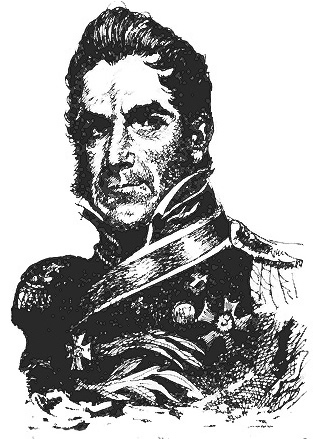|
Profile - David Jewett, Naval Adventurer
America has produced many unique characters, some famous and some not. Belonging to the latter class is David Jewett (1772-1842). The son of a sometime surgeon in the Continental Army, he was born into a comfortable middle-class family in what is now Montville, Connecticut. In his mid-teens Jewett began reading law under Roger Griswold, a kinsman by marriage and later the governor of the state. At one point, however, the young man interrupted his studies to sign on to a merchant ship (apparently commanded by a relative) for a voyage to Spain. While many young New England men punctuated their lives with a voyage or two before settling down to farming or trade, Jewett found the sea much more to his liking than the law. Upon returning to the United States, he abandoned the law and applied himself to learning navigation. Over the next few years he made a number of voyages, quite literally learning the ropes and seamanship, and rose to command his first merchant ship when he was just 19. In 1799, during the “Quasi-War with France” (1798-1801), Jewett was commissioned Master Commandant (lieutenant commander) in the U.S, Navy. He was shortly given command of the new 18-gun sloop-of-war Trumbull, in which one of his brothers served as a lieutenant and another brother and a cousin as midshipmen.
In the spring of 1800, Jewett took Trumbull to join the American squadron in the West Indies to help protect U.S. shipping from French commerce raiders. He would command Trumbull for two tours in the West Indies, during which she took two French prizes, neither very profitable. Shortly after Quasi-War ended Trumbull was paid off, and then Jewett was discharged from the Navy on June 6, 1801. Over the next few years he commanded various merchantmen, mostly out of New York. With the coming of the War of 1812 (1812-1814), Jewett went to sea as captain of a privateer, though how profitable the venture was is unknown. In 1816 the “United Provinces of the Río de la Plata” (i.e., Argentina), rebelled against Spain, and shortly afterwards Jewett, tired of being a merchant seaman again, joined the new nation’s navy as a “coronel de la marina – colonel of the navy.” By 1819 he commanded the frigate Heroína, and raided Spanish commerce from the coast of the Americas all across the Atlantic. But a scurvy epidemic broke out aboard the ship, leading to a mutiny that Jewett put down with considerable brutality. On the voyage back to Argentina, Heroína nearly foundered in a storm and on October 27, 1820 had to put in at Puerto Soledad, in the Falklands Islands. Although formerly claimed by Spain, in 1777 ownership of the islands had been transferred to Britain. The British had, however, not imposed any authority over the archipelago and its unruly inhabitants, and so Jewett claimed it for the United Provinces as the Malvinas, with consequences to the present. Soon afterwards, with 40 percent of his original crew of 200 dead or suffering from severe scurvy or other diseases, Jewett returned to Buenos Aires, where he was shortly relieved of command. It seems that during commerce raiding operations, he had taken two neutral ships, the Portuguese Carlota and the American Rampart, which caused serious diplomatic consequences for the infant Republic.
Looking around for something to do, Jewett entered the Imperial Brazilian Navy, being promoted to “Chefe d’escuarda – Division Commander”, equivalent to a rear admiral. He served under Adm. Thomas Cochrane, the famous British naval adventurer. In the course of his service, Jewett commanded in several naval actions and raids during the Brazilian War for Independence (1822-1825), the Brazilian-Argentine War (1825-1828), and in support of the anti-Argentine faction in the Uruguayan Civil War (1839-1851). From 1825 he was effectively the senior officer in the Brazilian Navy.

Rear Adm. David Jewett, Imperial Brazilian Navy
--Courtesy Wikipedia
In 1827, while on a purchasing mission to the United States, Jewett met and married the widowed Mrs. Eliza McTiers, daughter of Augustine H. Lawrence, a prominent New York City politician. Their honeymoon consisted of a voyage back to Brazil aboard the 12-gun brig Spark, which he had just bought from the U.S. Navy. The couple made their home in Rio de Janeiro and had three children, only one of whom survived to adulthood. Admiral Jewett died in 1842, and Mrs. Jewett passed on soon afterwards.
Jewett family tradition has it that, during his visit to the United States in 1876, on the occasion of the centennial of the Declaration of Independence, Emperor Dom Pedro II of Brazil said "Admiral Jewett was one of our heroes."
“He was an interesting fellow,” one of the admiral’s American kinsmen recently commented, “but I wouldn’t call him ‘nice’.”
--With thanks to the Jewett family
|